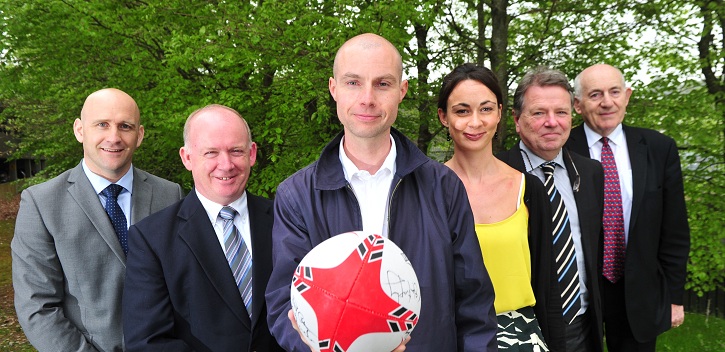2014 Press Releases
The Irish Rugby Team has Exceptional Guts

Scientists in Cork carried out a study in conjunction with the Irish Rugby Football Union which revealed that exercise and associated dietary changes influence gut microbial diversity.
The scientists at the Science Foundation Ireland-funded Alimentary Pharmabiotic Centre (APC) at University College Cork and Teagasc Food Research Centre, Moorepark, found that
- The gut microbiota of athletes is more diverse than that of controls
- This diversity is linked to exercise and protein consumption in athletes
- Athletes have lower inflammatory and improved metabolic markers relative to controls
- The research is published this week in the leading international journal Gut
The importance of our gut microbes to health and defence against disease is becoming ever more apparent. In particular, high microbial diversity has been associated with increased health whereas a low diversity of gut microbes has been associated with several diseases and syndromes, including obesity.
To investigate the impact of exercise and diet, scientists at the Alimentary Pharmabiotic Centre studied a group of “elite” athletes – the Irish Rugby football team. The study was carried out with 40 male elite professional rugby players (mean age 29; mean BMI = 29.1) immediately prior to the last Rugby World Cup. Because of the physical size of modern rugby players, two groups of healthy male controls of similar age but with BMIs of >28 and <25 were used.
This study highlighted that the gut microbiota of our National Rugby team had a very high diversity relative to the Irish general public (as revealed by High Throughput Sequencing).
The athletes are an exceptional group in terms of their dietary intake, fitness/endurance and now we know, in relation to their gut microbiota! This high diversity is particularly linked with exercise and protein consumption and suggests that eating specific proteins and/or exercise can provide a means of increasing microbial diversity in the gut.
This is the first report that exercise increases microbial diversity in humans. While we and others have previously shown that diet influences microbial diversity, we can now report that protein consumption, in particular, positively correlates with microbial diversity.
The study poses new questions and the Cork team is now prospectively testing the impact of exercise on the microbiota in amateurs of various degrees of fitness and will distinguish the effects of exercise from associated dietary changes. Original Article
Clarke, S.F., Murphy, E.F., O’Sullivan, O., Lucey, A.J., Humphreys M, Hogan, A., Hayes, P., O’Reilly, M, Jeffery, I.B., Wood-Martin, R., Kerins, D.M., Quigley, E., Ross, R.P., O’Toole, P.W., Molloy, M.G., Falvey, E., Shanahan, F & Cotter, P.D. Gut 2014 Published online first 09/06/2014 doi:10.1136/gutjnl-2013-306541 “Exercise and associated dietary extremes impact on gut microbial diversity”
ENDS
About the APC: The Alimentary Pharmabiotic Centre, http://apc.ucc.ie is a national centre for food and medicine funded by government and industry through Science Foundation Ireland’s Research Centres’ programme. The APC spans across UCC, Teagasc (Ireland's Agriculture & Food Development Authority) and Cork Institute of Technology. APC’s research explores how bacteria in the human gut impact on population health, leading to the development of future foods and medicines.
